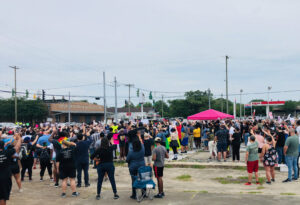
Rally-goers reach their hands in prayer toward the family of Victor White III, who died in police custody in Iberia Parish in 2014.
The George Floyd protests spread west across coastal Louisiana yesterday, from New Orleans to Baton Rouge, Lafayette, and Lake Charles, 30 miles from Texas.
The Lake Charles rally, sponsored by the Black Heritage Festival of Louisiana and Black Lives Matter, was held at the busy intersection of Broad and Enterprise streets, just east of downtown and a mile south of North Lake Charles, which is predominantly black. The intersection is also near the Lake Charles Police Department.
Several hundred turned out, despite only two days’ notice and a flurry of racist messages on social media the day before. Local commenters, who appeared to be white, threatened to run down protestors with cars and to shoot 50 people. One man posted a photo of a double-barreled AR-15 resting on his steering wheel, with comments such as, “You put holes in a couple of these thugs and it’s game over!”
Louisiana has some of the weakest gun laws in the country, with no licensing, registration, waiting period, or background checks, and the fourth-highest death rate by guns.
Another man on social media, intending to intimidate, announced a “2nd Amendment Expression of rights” at the same intersection, to start half an hour before the George Floyd protest. A woman crowed this had forced the Floyd rally to move across town. This was not true, and no one showed up for the gun-rights rally.
The rally for George Floyd started with music. Protestors held signs, greeted each other, prayed together, and listened to speakers such as the father of Victor White III, whose son supposedly shot himself in the chest, while in police custody, with his hands cuffed behind his back.
Donald Thomas, a community activist and the event’s MC, said, “Now I know what they’re saying online, all the threats, all the negative chatter, but I’m here to tell you those people are the minority. Love, peace, are the majority. If you believe that, say amen.” He said after quarantine everyone needed an outlet. “I needed to get out and love on somebody, and be loved back.”
About 20 minutes into the event, a pickup truck coming down Enterprise slowed as it approached the intersection. With what may be the worst timing on record, a white voice shouted “F*ck n***ers!” from the truck, as the light changed, trapping them at the edge of the rally. The crowd made a noise unlike anything I have heard before, a sort of growl that began to rise in pitch and volume. Donald Thomas redirected the protestors’ attention, said it was ok, to send them some love, and kept the program going. The truck and its occupants had to wait there for what seemed like five minutes, and its occupants did not say another word.
Lake Charles, a small petrocity of 78,000, is racially and economically split. North Lake Charles is poverty-stricken. South Lake Charles, predominantly white, has country clubs, gated neighborhoods, and a planned community. In multiple incidents over recent years, someone left recruitment flyers for the KKK around South Lake Charles neighborhoods.
In December 2019 two white LCPD officers “pleaded guilty to a misdemeanor charge of deprivation of rights under color of law in federal court,” stemming from the use of excessive force in two separate incidents. Suspects were beaten 10 to 30 times in the head or abdomen with a baton or a flashlight. A third Lake Charles officer was sentenced to 18 months in prison for his involvement in one of the episodes. Even the defense attorney for one of the men said he acted as he did because it was “in the culture” of LCPD misconduct. Police officers were not evident at the rally, though someone had three drones on station overhead.
The rally began to close with the release of balloons for previous black victims of police violence, and their names were called one-by-one. My son and I walked back to get our car, parked at the old Central School, now a community center and the home of the Mardi Gras Museum of Imperial Calcasieu. Three young white girls passed us, headed in the general direction of the rally.
An older white man in a beige mini-pickup slowed as he passed in front of the girls. “There’ll be no race traitors,” he said out his open window, then sped toward Broad Street.
